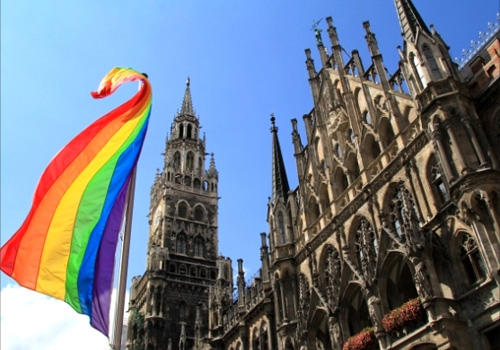Ukrainian volunteers learned about the history of the LGBT movement in Germany
In Munich Ukrainian group of volunteers were introduced to the main historical milestones of the LGBT movement development in the city and in Germany in general.
Struggle for LGBT rights in Germany began in ХIХ century by the lawyer and human rights defender Karl Heinrich Ulrichs. He was the first who declared that gays should have the same rights as everyone else, and it was he who suggested the term "uranizm" to indicate homosexuality. He developed this subject in a series of books entitled "Research on the Riddle of Male-Male Love", written in 1860-s-1870-s.
Ulrichs developed a classification of human sexual types, based on which he believed that homosexuals were neither truly male nor female, but rather belonged to the third sex. He called these people "Uranus" or "Urning". Ulrichs believed that uranizm is an innate human characteristic, and claimed that homosexuals should not be criminalized for "sodomy". Making speech at the Congress of German Lawyers he demanded to the abolition of anti-gay legislation; however his suggestion were not supported by the other lawyers. For creation of "Urning Union" Ulrichs was himself imprisoned for two years.

German law criminalizing same-sex relations between men – the infamous Paragraph 175 – also experienced a number of changes. For the first time it was adopted in 1872 and in 1935 it was toughened in relation to Hitler and the Nazi Party coming to power. Only in 1969 it was a bit eased: it was considered to be criminal having sex relations with persons under 21 years; and in 1973, this threshold was reduced to 18 years of age. Paragraph 175 was cancelled only in 1994.
The first legal framework for sex change appeared in Germany in 1980: the law allowed you to change the name and the documents – but only after the conclusion of the expert.
New phase of development of the LGBT movement in Munich began in 1996, as LGBT Party "Pink List" won a seat in the city council. It gave an opportunity to make proposals, and many of them were supported. For example, a square in the center of Munich was named after Karl Heinrich Ulrichs.
In Germany same-sex partnerships started to be registered in 2001, and in 2006 was adopted a law on combating discrimination, including discrimination based on sexual orientation and gender identity.
A very recent law passed in Germany in 2013 can be considered as quite progressive. It allows parents of intersex children avoid putting a gender mark on their birth certificate, as well as avoid choosing the gender fro surgical correction: such a right is granted to the child, who would grow up and then make a choice.
Press service of UPO "Gay Alliance Ukraine"
Photo by ru.wikipedia.org, themunicheye.com
Автор: Press service of UPO “Gay Alliance Ukraine”

